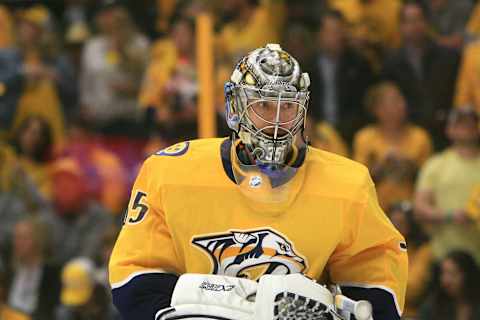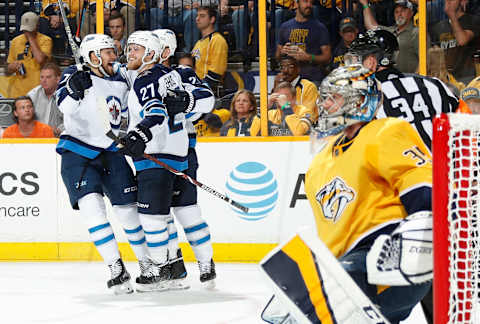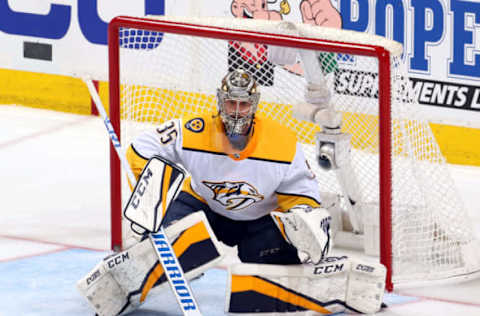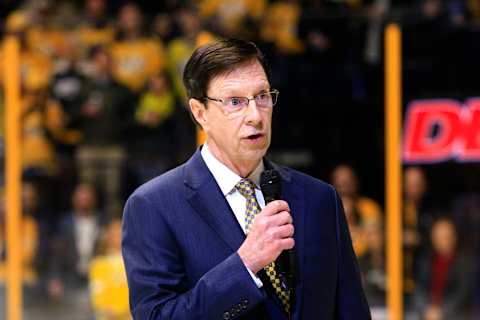Nashville Predators: What’s the plan for Pekka Rinne?


Changes may be coming for the Nashville Predators after a less than ideal exit from the 2018 Stanley Cup Playoffs, and Pekka Rinne could be one of them.
The Conference Finals of the Stanley Cup Playoffs have been interesting, to say the least. While the Washington Capitals are playing better against the Tampa Bay Lightning than many expected, the Vegas Golden Knights responded well from their Game 1 loss to Winnipeg. Was this the final four that hockey minds predicted? Yes and no. The Nashville Predators were supposed to be a part of it.
Tampa was a pegged a Stanley Cup favorite from before the season even started while Washington needed to get out of the second-round at some point. Vegas’ Disney Channel arc was meant to run out at some point, but San Jose wasn’t the group to do it. And then there’s Winnipeg.
More from Puck Prose
- Detroit Red Wings 2023 Rookie Camp Has Plenty of Ups and Downs
- This Columbus Blue Jackets rookie doesn’t want to be forgotten
- 2 trades the Boston Bruins must make to secure the Stanley Cup
- 3 reasons the Avalanche won’t win the Stanley Cup in 2024
- This is a big year for Alex Turcotte and the Los Angeles Kings
The toughest second-round series to predict was the one between the Jets and Preds. In many respects, that was the 2018 Stanley Cup Final. Nashville never got a series lead over Winnipeg, but both teams pushed each other to the brink. It would have to be settled in Game 7, but it didn’t take long for a victor to be crowned.
Which brings us to the core of this piece: Pekka Rinne. As much as many try to hold the series loss on a more overlooking scheme, goaltending was the deciding factor between the two teams. The first Paul Stasny goal was understandable. Roman Josi, Ryan Ellis, and Craig Smith stopped moving leaving him uncontested by the net.
Rinne lost sight of the initial shot and Stastny backhands it in with the extra room. Again, it happens. Tyler Myers’ goal absolutely cannot go in by any circumstance. It was the goal to make it 2-0 that saw Rinne get the pull leaving Juuse Saros to pick up the pieces.

Rollercoaster Performance
What makes things worse for Rinne and the Nashville Predators is that it wasn’t a one-time event. The veteran goaltender had a very rocky series against Winnipeg. Some like to throw around the ‘peaks and valleys’ cliche, but that was actually the case with Rinne.
- Game 1: 3 goals against/13 saves/.813 Sv%
- Game 2: 4 goals against/46 saves/.920 Sv%
- Game 3: 5 goals against/38 saves/.884 Sv%
- Game 4: 1 goal against/32 saves/.970 Sv%
- Game 5: 6 goals against/20 saves/.769 Sv%
- Game 6: 34-save shutout
It’s harsh, but based on the trend, you could sniff out what kind of night Rinne was going to have. There were even games in round one against the Colorado Avalanche that threw the 35-year-old for a loop. Most importantly Games 3 that saw Rinne allow 4 goals on 15 shots (.733 Sv%).
To make matters worse, Game 7 was the fourth time Saros had to go in for relief. Here’s what Rinne had to say.
“I obviously feel very much responsible for our season ending at this point. Tough. Tough to swallow. Tough to understand. You know, I can’t point on anything. Felt good and no injuries, totally healthy and total ups and downs throughout the playoffs. And obviously, you know, the biggest moment of the season, it’s a terrible feeling. You let your teammates down, and that’s what happened tonight.”
After a season that had the Predators win the President’s Trophy with a 117-point performance, the second-round was nowhere close to where they wanted to be. The question remains, do the Preds need to make any grand changes or can they accept the fact that they ran into a really good team?
I’d agree that the former is the better option to accept. However, seeing the way things ended may sway David Poile to be a little more proactive on a number of fronts. He’s already announced that Alexei Emelin and Scott Hartnell will not be returning. But that may not be the only change.
Poile says defenseman Alexei Emelin and forward Scott Hartnell are unlikely to return next season. #Preds
— Brooks Bratten 🍪 (@brooksbratten) May 14, 2018
It may be time for the Predators to move on from Rinne. Not just because of what happened this year, but based on the importance of goaltending in the NHL. It’s apparent now more than ever that a team can’t reach the depths of the playoffs without it.

The Bigger Picture
It sounds crazy to imagine the Nashville Predators without Rinne as it’s number one goaltender. He’s held that role since the 2008-09 season. That being said, there’s a reason people say NHL front office personnel have to be ruthless. Sometimes those players who have been with you for years eventually have to be cut away. This may be that point for the Predators.
Rinne’s numbers in the regular season are undeniable. He finished with the highest Sv% (.937) among goaltenders who saw at least 2500 minutes of play at 5v5. Looking further into his regular season numbers, Rinne had a delta save percentage (dSv%) of +0.96 and a goals saved above average (GSAA) of 13.07.
His dSv% shows that he performed this year slightly above the average goaltender, which is what many would expect. Additionally, the latter stat indicates that the Rinne saved the Nashville Predators 13 goals on his own. If a league-average goaltender was between the pipes, that 204 goals against total from Nashville would have 13 added to it.
There’s nothing to say otherwise that Rinne isn’t a good option in net for a team. It’s his performances in the playoffs that make him a liability at times. Think back to last year’s Stanley Cup Final. Rinne was pulled in Game 1 after allowing 4 goals on 11 shots and had two other less than ideal games in net.
Having your starting goaltender implode on the largest scale has to sting, and unfortunately, it happened again this year. Saros is a young goalie who looks ready to step into a starting role. He’s finished both seasons with the Nashville Predators with at least a .920 Sv%. The 23-year-old is also an RFA finishing off the final year of his entry-level contract.

There Should be Interest for Rinne
Rinne has one more year left on his deal that has him make $7 million annually. That may be a tough pill for some teams to swallow but having the Nashville Predators retain on the contract would help. Who would be interested in Rinne? Teams such as the Carolina Hurricanes, Buffalo Sabres, and Philadelphia Flyers make the most sense.
Carolina needs a steady goaltender. They thought they had one in Scott Darling, but his struggles forced them to return to their familiar hero in Cam Ward. Seeing as how the 33-year-old is a UFA this offseason, the Hurricanes will be or at least should be, looking to add a fresh face in net.
Philadelphia is in a similar boat as to teams looking for an answer in net. Injuries to Brian Elliott and Michael Neuvirth saw the Flyers trade for Petr Mrazek near the deadline. Mrazek started in 15 games (6-6-3 record, .891 Sv%) but only one in the playoffs. It’s safe to say that he wasn’t an immediate answer.
The Flyers are still committed to both Elliott and Neuvirth for the 2018-19 season while Mrazek is an RFA. Perhaps they find a way to make it work. The Flyers also have a goalie for the future in Carter Hart, who has been successful at every level. Acquiring Rinne could help them ensure he can properly develop and not be rushed.
Buffalo could be a front-runner in the discussion if Rinne is made available. They don’t have any goalies signed for next season, and GM Jason Botterill looks determined to turn things around. Winning the draft lottery was a start and bringing in a veteran like Rinne could stabilize things on the ice for the Sabres.
There are a lot of what-ifs and maybes here, but the takeaway message is that all good things come to an end. If Saros is the future, it’ll be better to give him the reigns now instead of waiting later.
Next: Ranking Each NHL Team's All-Time Starting Lineup
Despite his playoff blunder, Rinne has value and may even walk away with the Vezina in Vegas this year. Whether he’s still a member of the Nashville Predators or not is something to pay attention to.